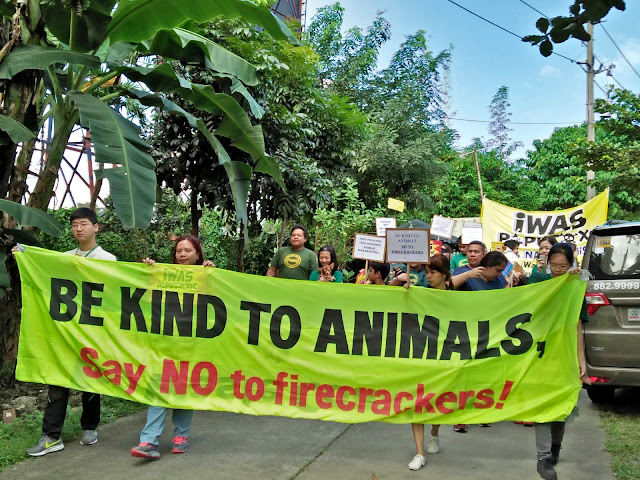Groups: Firecrackers and Fireworks Are Hazardous for Cats and Dogs, Too
An animal welfare group and an environmental watchdog group have joined forces to dissuade the general public from lighting firecrackers and fireworks for the safety not only of human beings, but also of our furry friends.
In a joint appeal ahead of the Christmas and New Year festivities, the Philippine Animal Welfare Society (PAWS) and the EcoWaste Coalition urged Filipinos from all walks of life to say no to firecrackers and fireworks to avoid inflicting harm on cats and dogs who are gifted with a highly developed sense of hearing.
“The exploding noise from firecrackers and other pyrotechnics is torture to animals like cats and dogs who have a very keen sense of hearing,” said Anna Cabrera, Executive Director, PAWS. “Aside from the ear-splitting noise, smoke inhaled from detonated firecrackers may cause anxiety, disorientation, loss of appetite, and an upset stomach for our furry companions. What is worse is if they accidentally eat remnants of the firecrackers, this will result in gastrointestinal problems – symptoms of which could be abdominal pain, bloody diarrhea and vomiting.”
Cabrera also revealed that post-New Year’s revelry, PAWS usually receives shocking reports of chained dogs strangling themselves to death or injuring themselves from trying to run away from the loud explosions on New Year’s Eve.
“Firecrackers bring about a terrified response from many dogs and they could sustain serious and even fatal injuries just trying to get away from the deafening noise.” She pointed out that the situation is even worse for strays – who often find themselves with no safe space to hide in.
PAWS further cautions that there is usually an increase in reports of lost pets during the first week of January due precisely to pets escaping from the confines of their homes during New Year’s Eve after being spooked by firecrackers.
For her part, Aileen Lucero, National Coordinator, EcoWaste Coalition, emphasized that “firecrackers and fireworks represent a clear danger for animals and human beings and the environment at large,” adding “it’s time to let go of our toxic and warlike tradition to herald the New Year.”
“For the health and safety of our canine and feline friends and our own children, we urge all individuals, households and business establishments to steer clear of firecrackers and fireworks and opt for a new way of welcoming 2023 without causing harm to animals, humans and the ecosystems,” she said.
Aside from urging one’s own family members and friends to not use firecrackers as they are bad for the animals and the environment, PAWS and the EcoWaste Coalition identified the following helpful hints to minimize stress for pets if one anticipates that their neighborhood will not be free from the use of firecrackers and fireworks this coming New Year:
- Walk or take your pets for a run or vigorous play or physical activity before it gets dark so they will be tired by night time and would be soundly sleeping by the time the revelry begins.
- Keep pets inside to avoid them becoming stressed or exposed to loud explosions and toxic fumes. Never chain or tie them outside your home – not only during New Year’s Eve; chaining or tethering should never go beyond an hour – as companion animals are meant to share family activities with us inside our home.
- Escape-proof your home to prevent pets from going out during the revelry. Make sure they have a collar with a tag indicating the pet owner’s details.
- Make pets pee or poo before the revelry starts, and give them ready access to water.
- Provide a quiet and safe spot where pets can stay during the revelry; shut the windows, pull the curtains down and play soft music inside your home.
- Turn on the television if this will help mask the noise of the firecrackers outside and if you think your pet prefers the sound of the TV over other loud noises.
- Act as normal and as calm as possible even while the explosions are at their worst so that your pets will take a cue from your behavior – that there is nothing to be alarmed about. Fussing over your pet may have the effect of increasing their tendency to panic.
- Talk to your veterinarian about giving your pet drops of “Rescue Remedy” or calming edible drops on their favorite treat (available in organic pet supply stores) ahead of time. Dog owners who may be able to afford it may consider purchasing an anti-dog anxiety vest for dogs that have an extreme fear or trauma response to firecrackers.
- Keep alcoholic drinks, chocolate, fruit cake, nuts, shopping bags, tobacco products, and cleaning agents out of pet's reach to prevent choking and poisoning incidents.
- Give stray animals a safe haven in your garage if you have the space – provide temporary shelter, food and water, especially during the revelry. (PAWS reminds pet owners to please not forget to spay-neuter pets at 6 months old or older so that they do not contribute to the problem of pet homelessness).
PAWS and the EcoWaste Coalition are enjoining the public to celebrate the festive days sans loud noise, toxic fumes and hazardous trash from firecrackers and fireworks.






Comments